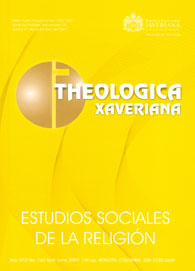Resumen
El cuerpo es una experiencia cultural. Las transformaciones sociales, políticas y religiosas de los siglos XVI y XVII alteraron la forma como el cuerpo se relacionaba con la mística. Un campo narrativo donde se reflejó este cambio fue en las hagiografías barrocas, en las cuales la corporeidad enriqueció la espiritualidad: trances, enfermedades y mortificaciones aparecieron en la escena de manera distinta a como eran tratadas en las hagiografías medievales. En el espacio colonial neogranadino, las narraciones de aquellos sujetos que habían muerto en fama de santidad, las vidas ejemplares, recogieron esta nueva experiencia de cuerpo. En estos textos, dirigidos a un público laico, se puede observar el lugar que ocupaba la mortificación y la penitencia en relación con una nueva experiencia de cuerpo en la cultura colonial.
Esta revista científica se encuentra registrada bajo la licencia Creative Commons Reconocimiento 4.0 Internacional. Por lo tanto, esta obra se puede reproducir, distribuir y comunicar públicamente en formato digital, siempre que se reconozca el nombre de los autores y a la Pontificia Universidad Javeriana. Se permite citar, adaptar, transformar, autoarchivar, republicar y crear a partir del material, para cualquier finalidad (incluso comercial), siempre que se reconozca adecuadamente la autoría, se proporcione un enlace a la obra original y se indique si se han realizado cambios. La Pontificia Universidad Javeriana no retiene los derechos sobre las obras publicadas y los contenidos son responsabilidad exclusiva de los autores, quienes conservan sus derechos morales, intelectuales, de privacidad y publicidad.
El aval sobre la intervención de la obra (revisión, corrección de estilo, traducción, diagramación) y su posterior divulgación se otorga mediante una licencia de uso y no a través de una cesión de derechos, lo que representa que la revista y la Pontificia Universidad Javeriana se eximen de cualquier responsabilidad que se pueda derivar de una mala práctica ética por parte de los autores. En consecuencia de la protección brindada por la licencia de uso, la revista no se encuentra en la obligación de publicar retractaciones o modificar la información ya publicada, a no ser que la errata surja del proceso de gestión editorial. La publicación de contenidos en esta revista no representa regalías para los contribuyentes.


